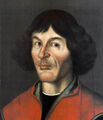Template:Selected anniversaries/May 24: Difference between revisions
No edit summary |
No edit summary |
||
| Line 4: | Line 4: | ||
File:Nikolaus Kopernikus.jpg|link=Nicolaus Copernicus (nonfiction)|1543: Mathematician and astronomer [[Nicolaus Copernicus (nonfiction)|Nicolaus Copernicus]] dies. He formulated a model of the universe that places the Sun rather than the Earth at the center of the universe. | File:Nikolaus Kopernikus.jpg|link=Nicolaus Copernicus (nonfiction)|1543: Mathematician and astronomer [[Nicolaus Copernicus (nonfiction)|Nicolaus Copernicus]] dies. He formulated a model of the universe that places the Sun rather than the Earth at the center of the universe. | ||
||1544: William Gilbert born ... physician, physicist, and | ||1544: William Gilbert born ... physician, physicist and natural philosopher. He passionately rejected both the prevailing Aristotelian philosophy and the Scholastic method of university teaching. He is remembered today largely for his book De Magnete (1600), and is credited as one of the originators of the term "electricity". Pic. | ||
File:Daniel Gabriel Fahrenheit.jpg|link=Daniel Gabriel Fahrenheit (nonfiction)|1686: Physicist and engineer [[Daniel Gabriel Fahrenheit (nonfiction)|Daniel Gabriel Fahrenheit]] born. He will help lay the foundations for the era of precision thermometry by inventing the mercury-in-glass thermometer and the Fahrenheit scale. | File:Daniel Gabriel Fahrenheit.jpg|link=Daniel Gabriel Fahrenheit (nonfiction)|1686: Physicist and engineer [[Daniel Gabriel Fahrenheit (nonfiction)|Daniel Gabriel Fahrenheit]] born. He will help lay the foundations for the era of precision thermometry by inventing the mercury-in-glass thermometer and the Fahrenheit scale. | ||
| Line 10: | Line 10: | ||
File:Georg Ernst Stahl.png|link=Georg Ernst Stahl (nonfiction)|1734: Chemist and physician [[Georg Ernst Stahl (nonfiction)|Georg Ernst Stahl]] dies. His works on phlogiston continue to be accepted as an explanation for chemical processes until the late 18th century. | File:Georg Ernst Stahl.png|link=Georg Ernst Stahl (nonfiction)|1734: Chemist and physician [[Georg Ernst Stahl (nonfiction)|Georg Ernst Stahl]] dies. His works on phlogiston continue to be accepted as an explanation for chemical processes until the late 18th century. | ||
||1743: Jean-Paul Marat born ... physician, journalist, and politician. | ||1743: Jean-Paul Marat born ... physician, journalist, and politician ... French Revolution ... a vigorous defender of the sans-culottes and seen as a radical voice. He published his views in pamphlets, placards and newspapers. Pic. | ||
||1794: William Whewell born ... priest and philosopher. Pic. | ||1794: William Whewell born ... priest and philosopher. Pic. | ||
Revision as of 06:21, 3 March 2019
1089: Celebrated jurist and monk Lanfranc dies.
1543: Mathematician and astronomer Nicolaus Copernicus dies. He formulated a model of the universe that places the Sun rather than the Earth at the center of the universe.
1686: Physicist and engineer Daniel Gabriel Fahrenheit born. He will help lay the foundations for the era of precision thermometry by inventing the mercury-in-glass thermometer and the Fahrenheit scale.
1734: Chemist and physician Georg Ernst Stahl dies. His works on phlogiston continue to be accepted as an explanation for chemical processes until the late 18th century.
1844: Samuel Morse sends the message "What hath God wrought" (a biblical quotation, Numbers 23:23) from the Old Supreme Court Chamber in the United States Capitol to his assistant, Alfred Vail, in Baltimore, Maryland, to inaugurate a commercial telegraph line between Baltimore and Washington D.C.
1928: Mathematician Bertram Kostant born. He will be one of the principal developers of the theory of geometric quantization.
1940: Igor Sikorsky performs the first successful single-rotor helicopter flight.
1944: Field Report Number One (Peenemunde edition) reveals Nazi efforts to use Gnomon algorithm functions for rocket propulsion.
1963: Plutonium used for crimes against mathematical constants, says John Brunner.







